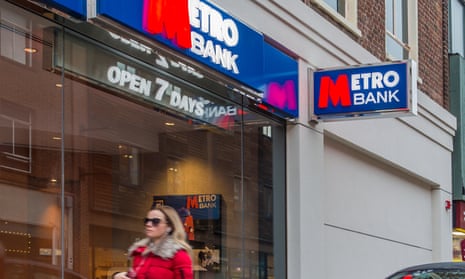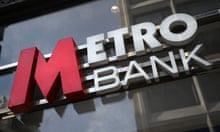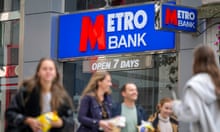Once upon a time, Metro Bank was going to shake up the old guard in the banking world via the radical strategy of opening branches while others were closing them. The talk was of simplicity, ease of doing business and free dog biscuits. An awful lot of retail shareholders bought into the hype, unfortunately, when Metro floated on the stock market at £20 a share in 2016.
Those investors have now received a harsh lesson. The last time Metro was rescued in 2019, the process involved raising £375m via issuing new equity at 500p a pop which was bad enough. The latest financing package, though, will see a near-quadrupling of the share count by printing new shares at 30p. Small investors are being diluted to near-irrelevance as a Colombian billionaire, Jaime Gilinski Bacal, emerges with 53% ownership.
The good news is that Metro is still alive and thus still has a shot of achieving its ambition to be “the UK’s number one community bank”. But long-term loyalists could be forgiven for thinking this was not the moment for its chief executive, Dan Frumkin, to boast that “there is nothing wrong with the Metro business model” and that “the missing ingredient was a bit more capital”. Metro’s need for a bit more capital at regular intervals has so far resulted in a capital loss of 97.5% for those who bought at the flotation.
Frumkin arrived in 2019, so cannot be blamed for the damaging episode in which Metro had to confess holding too little capital against its loan book (unimpressed regulators issued a fine). He also inherited the ticking timebomb of the £350m-worth of debt that needed to be refinanced. He and Metro get a plus point for producing a capital solution at the weekend that, in a technical sense, works. Strong-arming bondholders into accepting a haircut, albeit at the cost of issuing new high-interest bonds, is a mini-achievement.
But there is still a considerable job to do to demonstrate that this business, even in freshly capitalised form, can generate operating ratios that vaguely resemble those of larger banks. Last year’s cost-to-income ratio was 106% when others try to shoot for 60% or less. Even with a loosely described plan to cut costs at a rate of £30m year, Metro still expects to be above 60% until the 2027 financial year.
Metro will also move away from plain-vanilla mortgage lending and towards the “specialist” variety, plus commercial lending. That sounds a sensible way in theory to seek higher risk-adjusted returns away from the most competitive corner of the lending market. It’s just that analysts at KBW called the assumption of double-digit loan growth “heroic in the current environment”.
Being generous, one can say there’s definitely a fair argument that the regulatory rules on capital unfairly penalise “challenger” banks like Metro. On the other hand, one cannot truly blame regulators for being strict after the bank’s 2019 saga. Therein lies the challenge for the challengers and, unfortunately, there is little prospect of relief.
Metro, one hopes, will now be able to navigate a way to stability and reliable profits. The customers do seem to like the bank, after all. But, at this late stage, success may simply mean getting to a position where one of the bigger beasts in the banking jungle wants to buy it. Revolutions are hard.










